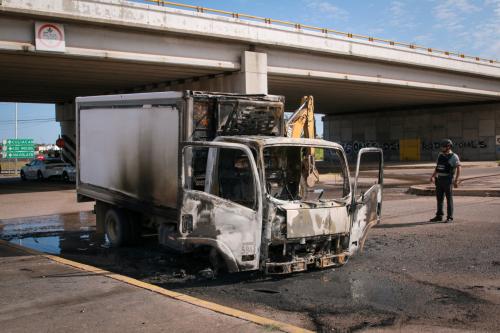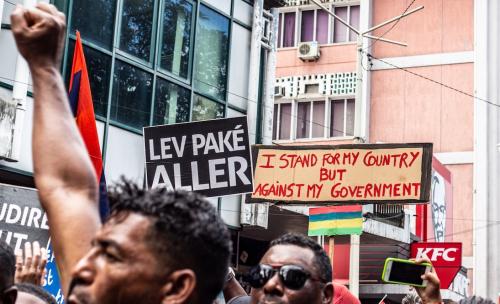Today, the Brookings-LSE project on Internal Displacement and the International Organization for Migration (IOM) hosted an event to release a new report, “Supporting Durable Solutions to Urban, Post-Disaster Displacement: Challenges and Opportunities in Haiti.”
Brookings Fellow Megan Bradley, who moderated the discussion, discussed the new study in this blog post.
William Lacy Swing, director-general of IOM, delivered the following remarks (edited slightly for clarity):
I’m particularly pleased to be here today both because of my attachment and long friendship with Haiti. And every occasion like this that puts Haiti in the public eye is a positive thing. The problem with all of these situations is, that once the cameras dim or leave, and the media is gone, they sort of drop out of sight and out of mind. …
I’m also grateful because we need to give much more attention to how we do our work. To have a durability to what we actually do before we think the job is done and we walk out and the problem simply comes back to haunt us.
So we’re here today to launch this important joint study. And as the report says, in a matter literally of minutes if not seconds, an entire country was totally devastated. I was there within a couple of days after this, and having spent five years of my career in Haiti, I have to say that other than the Haitian people there was very little I recognized in Port-au-Prince. … I simply couldn’t tell where I was. It was like worse than a lunar landscape.
I used to say when I was in Haiti, that everything is broken there but the human spirit. Not to be derogatory of Haiti, but to address the difficult history that Haitians have had to endure. And we use the word “resilience”—which is a new buzzword in development circles. Haitian people are the quintessential example of resilience. They are survivors. They carry on.
I ran into an old friend of mine in Haiti those first couple of days after the earthquake, and he said to me in a way that only Haitians can put it. He said, “You know, the tragedy is, we lost what we didn’t have.” That’s a bit of Haitian humor that makes the point very well. … Very soon after our initial efforts, then you had this very large outbreak of cholera. So we’ve gone from one disaster to another and yet the country has continued to be able to cope with all of this.
So this study I think is exceedingly important. And I’m very grateful to Brookings, and to Canada and to the authors of this for having taken the time to tease out for us the lessons we’ve learned from this.
Clearly disasters, if we’re going to have a durable solution, have to be linked to development. Some of the problems there were developmental problems that were made worse by the earthquake.
The whole question of protecting and advancing human rights: I was just in Tacloban in the Philippines after the typhoon there. The women and the children at a time like this are absolutely vulnerable to sexual and gender-based violence. Same was true in Haiti. And things were going on under our very eyes we were so busy doing good as they say, that there was sexual and gender-based violence going on. Terrible examples of that. Children were being trafficked, literally trafficked out of the country by so-called well-meaning people. All of that was happening because we could not, I guess, do everything at once. But we have to do better in the future I assure you.
The densely inhabited character of Port-au-Prince: … IOM will be convening a major global conference next year on the question of migrants and cities. What’s the impact of IDPs and migrants and others on cities. What’s the dynamic? The impact of cities on these persons? We need to look at that much more closely.
When I met with President Martelly [during my annual visit to Haiti last year] I said, I have good news and I have bad news. Good news: a million fewer Haitians are now living in tent cities. But the bad news is 347,000 are still living there, and now it’s down to 147,000. We ran up against the constraints of trying to construct transitional housing quickly. Ran out of money, ran out of time. Went to the rental subsidy. The rental subsidy faltered, and the fact that there were not enough places to rent. And then there wasn’t enough land available which was a major limiting factor at the time. …
I think the country has suffered too much too long and we can’t do enough to support it.
One of the main lessons we’re learning is development challenges and displacement issues are interlinked. The study shows that many Haitian IDPs are still in a more vulnerable position in comparison than those who weren’t displaced. … So we need to tailor our development strategies to the needs of these IDPs. …
We are living in a period of unprecedented, multiple complex emergencies. When I met with Pope Francis recently, he used the phrase, We are now faced with the globalization of indifference. How do you keep the spotlight on a Haiti, or a South Sudan, or the Central African Republic where I was recently, where you have ethno-religious cleansing going on? And of course Syria is taking up much of the resources as we know. …
We took a lot of credit for doing a good job in Libya. Together with our traditional partner UNHCR we returned 247,000 migrant workers to 54 countries; 125 million dollars. Bravo. But what happened? We dropped them off. There were no jobs. There were not enough schools. There were not enough clinics. There were no more remittances coming home. So we did the job halfway. And if we’re serious as governments and international organizations, we have to rethink how we’re dealing with disasters. How do we build the durable solution?
I can tell you, it didn’t happen in Haiti. We thought we did a good job. We got people into housing. But as your study shows, they remain very vulnerable.
Now with all of these multiple complex disasters … we need to ask ourselves a serious question. Are we as international organizations and are we as governments really geared to address these situations in a serious, responsible manner? Do our parliaments, our congresses understand the humanitarian imperative upon all of us who have means to stay the course in these places?
I’ve gone a little far afield but I intentionally did that because I want to place it in the largest possible global context. And this is the value of this study. That it shows that we have to learn lessons and we have to do a more holistic and linked-up cooperative approach than we’ve done up to now.
Listen to the full audio here:
Panelists also included co-author of the study, Lorenza Rossi of IOM; Harry Adam, director of the Unit for Housing and Public Construction of the Prime Minister’s Office with the Government of Haiti; Gaetano Vivo from the World Bank; and Thomas Adams, U.S. special coordinator for Haiti.
The Brookings Institution is committed to quality, independence, and impact.
We are supported by a diverse array of funders. In line with our values and policies, each Brookings publication represents the sole views of its author(s).




Commentary
Amb. William Lacy Swing: If We’re Serious, We Have to Rethink How We’re Dealing with Disasters
March 14, 2014